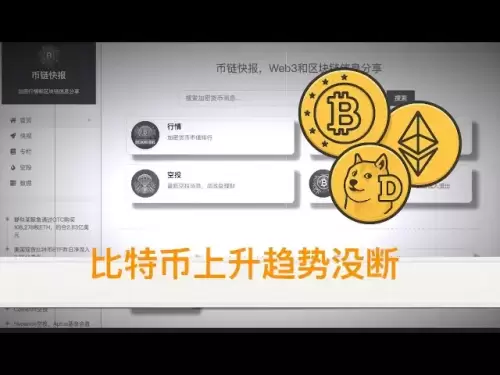-
 Bitcoin
Bitcoin $106,754.6083
1.33% -
 Ethereum
Ethereum $2,625.8249
3.80% -
 Tether USDt
Tether USDt $1.0001
-0.03% -
 XRP
XRP $2.1891
1.67% -
 BNB
BNB $654.5220
0.66% -
 Solana
Solana $156.9428
7.28% -
 USDC
USDC $0.9998
0.00% -
 Dogecoin
Dogecoin $0.1780
1.14% -
 TRON
TRON $0.2706
-0.16% -
 Cardano
Cardano $0.6470
2.77% -
 Hyperliquid
Hyperliquid $44.6467
10.24% -
 Sui
Sui $3.1128
3.86% -
 Bitcoin Cash
Bitcoin Cash $455.7646
3.00% -
 Chainlink
Chainlink $13.6858
4.08% -
 UNUS SED LEO
UNUS SED LEO $9.2682
0.21% -
 Avalanche
Avalanche $19.7433
3.79% -
 Stellar
Stellar $0.2616
1.64% -
 Toncoin
Toncoin $3.0222
2.19% -
 Shiba Inu
Shiba Inu $0.0...01220
1.49% -
 Hedera
Hedera $0.1580
2.75% -
 Litecoin
Litecoin $87.4964
2.29% -
 Polkadot
Polkadot $3.8958
3.05% -
 Ethena USDe
Ethena USDe $1.0000
-0.04% -
 Monero
Monero $317.2263
0.26% -
 Bitget Token
Bitget Token $4.5985
1.68% -
 Dai
Dai $0.9999
0.00% -
 Pepe
Pepe $0.0...01140
2.44% -
 Uniswap
Uniswap $7.6065
5.29% -
 Pi
Pi $0.6042
-2.00% -
 Aave
Aave $289.6343
6.02%
How are Bitcoin transaction fees calculated? When will the fees become high?
Bitcoin transaction fees, crucial for miners, depend on transaction size and user-set fee rates; high demand and network congestion can drive these fees up significantly.
May 02, 2025 at 11:07 am
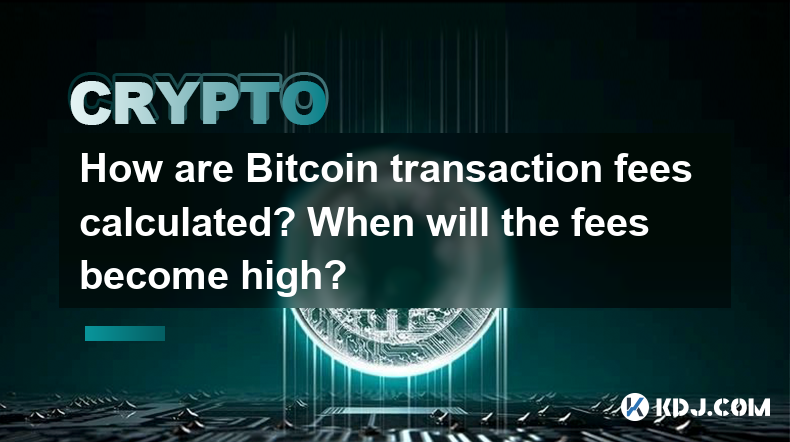
Bitcoin transaction fees are a crucial aspect of the cryptocurrency ecosystem, influencing the speed and priority of transactions on the blockchain. Understanding how these fees are calculated and the conditions under which they can become high is essential for users to effectively manage their transactions.
What are Bitcoin Transaction Fees?
Bitcoin transaction fees are payments made by users to incentivize miners to include their transactions in the next block. These fees are necessary because they compensate miners for the computational power and electricity used to secure the network. The fee is typically measured in satoshis per byte (sat/byte), where one satoshi is the smallest unit of bitcoin, equivalent to 0.00000001 BTC.
How are Bitcoin Transaction Fees Calculated?
The calculation of Bitcoin transaction fees involves several factors, primarily the size of the transaction in bytes and the fee rate set by the user. Here's a detailed breakdown of how these fees are determined:
Transaction Size: The size of a transaction is measured in bytes and depends on the number of inputs and outputs. Each transaction input and output adds to the total size. For example, a simple transaction with one input and one output might be around 250 bytes, while a more complex transaction with multiple inputs and outputs could be much larger.
Fee Rate: The fee rate is the amount of satoshis the user is willing to pay per byte. This rate is set by the user and can be adjusted based on how quickly they want their transaction to be processed. A higher fee rate increases the likelihood of the transaction being included in the next block.
Formula: The total fee is calculated by multiplying the transaction size (in bytes) by the fee rate (in sat/byte). For example, if a transaction is 250 bytes and the fee rate is 20 sat/byte, the total fee would be 250 * 20 = 5,000 satoshis.
Factors Influencing Bitcoin Transaction Fees
Several factors can influence the level of Bitcoin transaction fees at any given time:
Network Congestion: When the Bitcoin network experiences high volumes of transactions, miners have more transactions to choose from. This can lead to increased competition for block space, driving up fees. During periods of high demand, users may need to pay higher fees to ensure their transactions are processed quickly.
Block Size Limit: The Bitcoin blockchain has a block size limit of 1 MB, which means only a certain number of transactions can be included in each block. When the number of pending transactions exceeds the capacity of the blocks, fees can rise as users bid to get their transactions prioritized.
Miner Preferences: Miners have the discretion to choose which transactions to include in a block based on the fees offered. They typically prioritize transactions with higher fees to maximize their revenue, which can lead to higher overall fees during periods of high demand.
When Will Bitcoin Transaction Fees Become High?
Bitcoin transaction fees can become high under specific conditions, primarily driven by network demand and congestion:
High Transaction Volume: During times of increased usage, such as major market movements or when large numbers of users are transacting, the network can become congested. This congestion leads to higher fees as users compete for limited block space.
Market Events: Significant events in the cryptocurrency market, such as major price fluctuations or the launch of new projects, can lead to a surge in transaction volume. For example, during a bull market, more users might be buying and selling Bitcoin, leading to higher fees.
Seasonal Trends: Certain times of the year, such as holidays or the end of the financial year, can see increased transaction activity, pushing fees higher. This is often due to a combination of increased consumer spending and speculative trading.
Network Upgrades: Occasionally, network upgrades or changes in the protocol can lead to temporary spikes in fees. This is usually due to increased activity as users and miners adjust to the new rules.
Strategies to Manage Bitcoin Transaction Fees
Users can employ several strategies to manage and potentially reduce their Bitcoin transaction fees:
Adjusting Fee Rates: Users can manually set their fee rates based on current network conditions. Tools like Bitcoin fee estimators can help determine an appropriate fee rate to ensure timely processing without overpaying.
Using SegWit: Segregated Witness (SegWit) is an upgrade to the Bitcoin protocol that allows for more efficient use of block space, effectively reducing transaction sizes and fees. Using SegWit-enabled wallets can help lower fees.
Batching Transactions: Combining multiple transactions into a single one can reduce the total fee. This is particularly useful for businesses or individuals who frequently send small amounts of Bitcoin.
Timing Transactions: Avoiding peak times of network congestion can help keep fees lower. Monitoring network activity and planning transactions during off-peak hours can be beneficial.
Frequently Asked Questions
Q: Can Bitcoin transaction fees be zero?
A: While it is theoretically possible to set a transaction fee to zero, such transactions are unlikely to be processed by miners, as they offer no incentive. Miners prioritize transactions with higher fees to maximize their revenue, so transactions with zero fees may remain unconfirmed for an extended period or indefinitely.
Q: How do transaction fees affect the security of the Bitcoin network?
A: Transaction fees play a crucial role in the security of the Bitcoin network. They incentivize miners to continue validating transactions and securing the network, especially as the block reward from newly minted bitcoins decreases over time. Higher fees can lead to increased miner participation, enhancing the network's security.
Q: Are there any alternatives to paying high Bitcoin transaction fees?
A: Yes, there are several alternatives to managing high Bitcoin transaction fees. Users can consider using other cryptocurrencies with lower fees, such as Bitcoin Cash or Litecoin, for smaller transactions. Additionally, layer-two solutions like the Lightning Network can facilitate faster and cheaper transactions off the main Bitcoin blockchain.
Q: How do I estimate Bitcoin transaction fees before sending a transaction?
A: To estimate Bitcoin transaction fees, users can use online fee estimators provided by services like BitcoinFees, BitInfoCharts, or directly through their wallet software. These tools analyze current network conditions and suggest appropriate fee rates to ensure timely transaction processing.
Disclaimer:info@kdj.com
The information provided is not trading advice. kdj.com does not assume any responsibility for any investments made based on the information provided in this article. Cryptocurrencies are highly volatile and it is highly recommended that you invest with caution after thorough research!
If you believe that the content used on this website infringes your copyright, please contact us immediately (info@kdj.com) and we will delete it promptly.
- 2025-W Uncirculated American Gold Eagle and Dr. Vera Rubin Quarter Mark New Products
- 2025-06-13 06:25:13
- Ruvi AI (RVU) Leverages Blockchain and Artificial Intelligence to Disrupt Marketing, Entertainment, and Finance
- 2025-06-13 07:05:12
- H100 Group AB Raises 101 Million SEK (Approximately $10.6 Million) to Bolster Bitcoin Reserves
- 2025-06-13 06:25:13
- Galaxy Digital CEO Mike Novogratz Says Bitcoin Will Replace Gold and Go to $1,000,000
- 2025-06-13 06:45:13
- Trust Wallet Token (TWT) Price Drops 5.7% as RWA Integration Plans Ignite Excitement
- 2025-06-13 06:45:13
- Ethereum (ETH) Is in the Second Phase of a Three-Stage Market Cycle
- 2025-06-13 07:25:13
Related knowledge
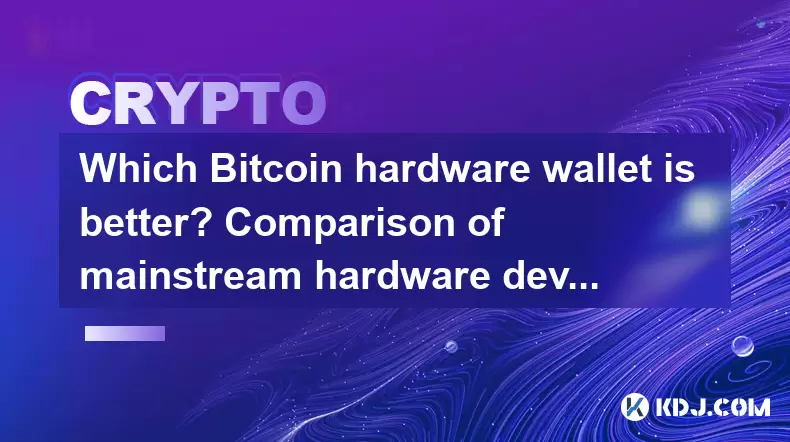
Which Bitcoin hardware wallet is better? Comparison of mainstream hardware devices
Jun 16,2025 at 02:08am
What Is a Bitcoin Hardware Wallet?A Bitcoin hardware wallet is a physical device designed to securely store the private keys associated with your cryptocurrency holdings. Unlike software wallets, which are more vulnerable to online threats, hardware wallets keep private keys offline, significantly reducing the risk of unauthorized access. These devices ...
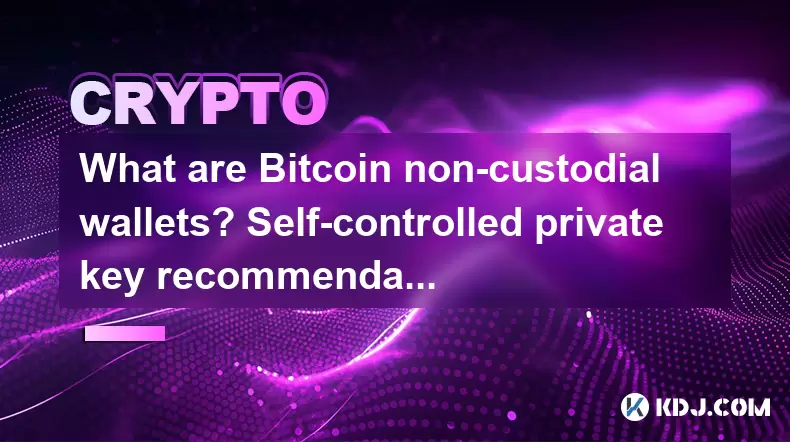
What are Bitcoin non-custodial wallets? Self-controlled private key recommendation
Jun 16,2025 at 11:29pm
Understanding Bitcoin Non-Custodial WalletsA Bitcoin non-custodial wallet is a type of digital wallet where users retain full control over their private keys. Unlike custodial wallets, which are managed by third-party services such as exchanges, non-custodial wallets ensure that only the user can access and manage their funds. This means no intermediary...
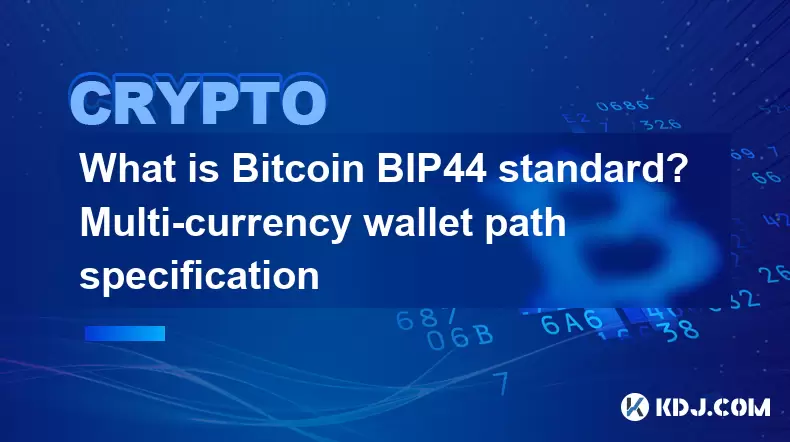
What is Bitcoin BIP44 standard? Multi-currency wallet path specification
Jun 15,2025 at 04:08pm
Understanding the BIP44 Standard in Bitcoin and CryptocurrencyThe BIP44 standard, which stands for Bitcoin Improvement Proposal 44, is a widely adopted hierarchical deterministic wallet structure used across various cryptocurrencies. It defines a structured path format that enables wallets to support multiple currencies while maintaining consistency and...
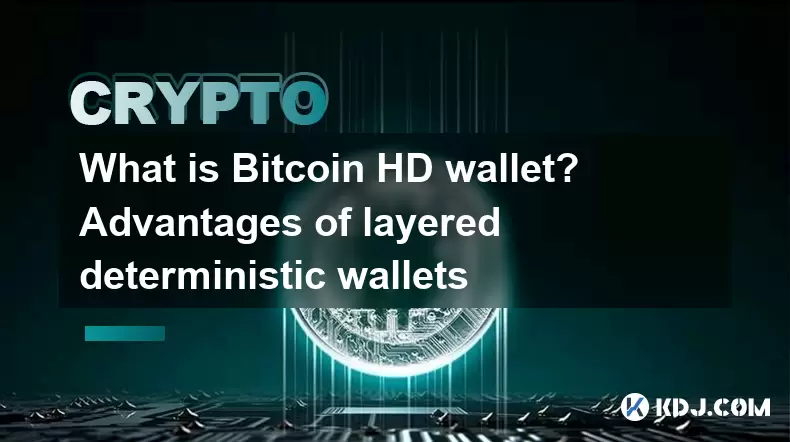
What is Bitcoin HD wallet? Advantages of layered deterministic wallets
Jun 16,2025 at 03:56pm
Understanding Bitcoin HD WalletsA Bitcoin HD wallet, or Hierarchical Deterministic wallet, is a type of cryptocurrency wallet that generates multiple keys and addresses from a single seed phrase. Unlike traditional wallets that create random private keys for each transaction, an HD wallet follows a structured hierarchy to derive keys in a deterministic ...
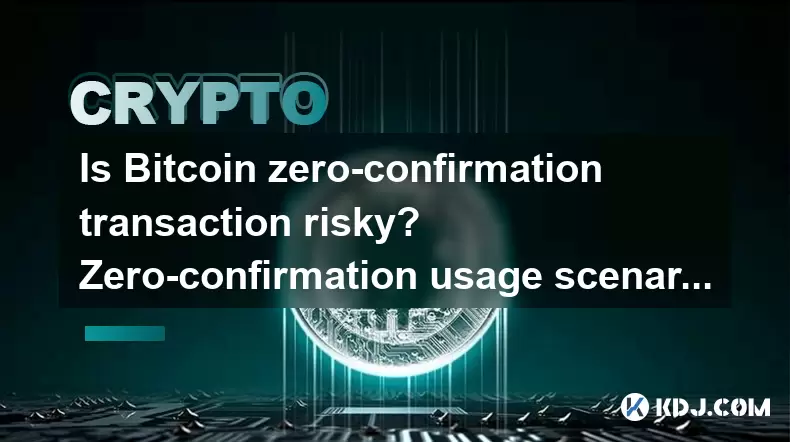
Is Bitcoin zero-confirmation transaction risky? Zero-confirmation usage scenarios
Jun 15,2025 at 03:57am
Understanding Zero-Confirmation Transactions in BitcoinBitcoin zero-confirmation transactions, often referred to as 'unconfirmed transactions,' are those that have been broadcast to the network but have not yet been included in a block. This means they have not received any confirmations from miners. While these transactions can be useful in certain con...
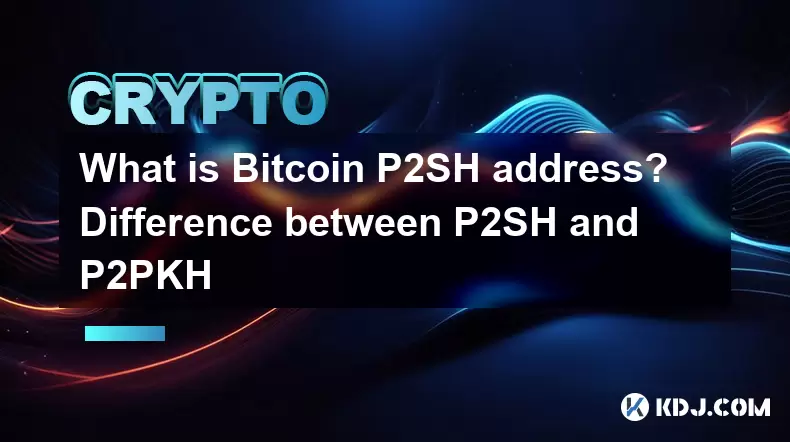
What is Bitcoin P2SH address? Difference between P2SH and P2PKH
Jun 16,2025 at 09:49pm
Understanding Bitcoin P2SH AddressesA Pay-to-Script-Hash (P2SH) address in the Bitcoin network is a type of address that allows users to send funds to a script hash rather than directly to a public key hash, as seen in earlier address formats. This innovation was introduced through BIP 16, enhancing flexibility and enabling more complex transaction type...

Which Bitcoin hardware wallet is better? Comparison of mainstream hardware devices
Jun 16,2025 at 02:08am
What Is a Bitcoin Hardware Wallet?A Bitcoin hardware wallet is a physical device designed to securely store the private keys associated with your cryptocurrency holdings. Unlike software wallets, which are more vulnerable to online threats, hardware wallets keep private keys offline, significantly reducing the risk of unauthorized access. These devices ...

What are Bitcoin non-custodial wallets? Self-controlled private key recommendation
Jun 16,2025 at 11:29pm
Understanding Bitcoin Non-Custodial WalletsA Bitcoin non-custodial wallet is a type of digital wallet where users retain full control over their private keys. Unlike custodial wallets, which are managed by third-party services such as exchanges, non-custodial wallets ensure that only the user can access and manage their funds. This means no intermediary...

What is Bitcoin BIP44 standard? Multi-currency wallet path specification
Jun 15,2025 at 04:08pm
Understanding the BIP44 Standard in Bitcoin and CryptocurrencyThe BIP44 standard, which stands for Bitcoin Improvement Proposal 44, is a widely adopted hierarchical deterministic wallet structure used across various cryptocurrencies. It defines a structured path format that enables wallets to support multiple currencies while maintaining consistency and...

What is Bitcoin HD wallet? Advantages of layered deterministic wallets
Jun 16,2025 at 03:56pm
Understanding Bitcoin HD WalletsA Bitcoin HD wallet, or Hierarchical Deterministic wallet, is a type of cryptocurrency wallet that generates multiple keys and addresses from a single seed phrase. Unlike traditional wallets that create random private keys for each transaction, an HD wallet follows a structured hierarchy to derive keys in a deterministic ...

Is Bitcoin zero-confirmation transaction risky? Zero-confirmation usage scenarios
Jun 15,2025 at 03:57am
Understanding Zero-Confirmation Transactions in BitcoinBitcoin zero-confirmation transactions, often referred to as 'unconfirmed transactions,' are those that have been broadcast to the network but have not yet been included in a block. This means they have not received any confirmations from miners. While these transactions can be useful in certain con...

What is Bitcoin P2SH address? Difference between P2SH and P2PKH
Jun 16,2025 at 09:49pm
Understanding Bitcoin P2SH AddressesA Pay-to-Script-Hash (P2SH) address in the Bitcoin network is a type of address that allows users to send funds to a script hash rather than directly to a public key hash, as seen in earlier address formats. This innovation was introduced through BIP 16, enhancing flexibility and enabling more complex transaction type...
See all articles























